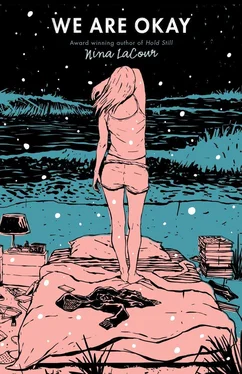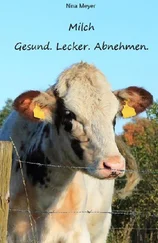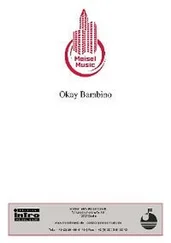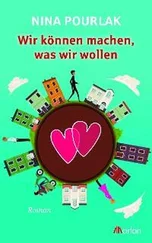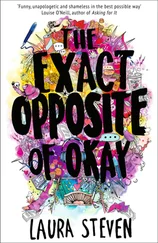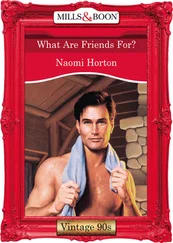I drag my desk chair over to my closet and stand on it so that I can reach the top shelf. I find the only thing up there: the photograph of my mother at twenty-two years old, standing in the sun. I borrow four of Hannah’s silver pushpins and choose the right spot on my bulletin board, just to the right of the snowflakes, and push the pins in against the corners of the photograph so that they hold it up without making any holes. It’s a big photograph, eight by ten probably, and it transforms the corner.
I’m not saying that it doesn’t scare me, to bring it into the light. My mother on Ocean Beach. Her sun-faded peach surfboard leaning under her arm. Her black wet suit and wet hair. Her squinting eyes and her huge smile.
It scares me, yes, but it also feels right.
I stare at her.
I try and I try and I try to remember.
A couple hours later, I take a long shower. I let the water run over me.
When I go back, whenever that will be, I’ll need to find something of Gramps’s to scatter or bury. I couldn’t laugh at Jones’s joke. Instead, it’s echoing the way true things always do when I’ve been trying to deny them. If your gramps had a grave, if your gramps had a grave. Enough time has passed by now that I know Mabel is right. But another version of the story springs up sometimes, one of him with pockets full of a few thousand dollars, gambling winnings he kept for himself, on his way to the Rocky Mountains.
I need to give him a grave in order to contain him. I need to bury something to anchor his ghost. One of these days, in some not-so-far future, I’ll take a trip into Jones’s garage and I’ll search through our old things and I’ll assemble a box of objects instead of ashes and I’ll find him a place to rest.
I rinse the conditioner out of my hair. I turn off the water and breathe in the steam.
He wore a gold chain around his neck on special occasions. I wonder if Jones bought it back for me.
I dry off and wrap myself in a towel. When I get back to my room, I look at my phone. It’s only two o’clock.
I take a cue from the list I made on my first night here alone and make soup. I chop vegetables and boil pasta, pour a carton of chicken stock into a pot.
Once I’ve combined all the ingredients and it’s time to wait while they cook, I turn to the second essay in the solitude book, but my mind is too full of different versions of the last summer’s story. There’s one where I fail him. Where I stop coming home so he stops making dinner, and I’m not around to see how much he needs me. And then there’s one where he fails me. Where I feel it—that he doesn’t want me there, that I’m in the way. So I stay away, for him and for me. So that I never face his rejection. So that I get to pretend I’m the most important thing to him, the way he is to me. Because if we have any sense of self-preservation, we do the best with what we’re given.
I was given cakes and cookies and rides to school. I was given songs and dinners at a table with brass candlesticks. I was given a man with a sensitive heart and a devious sense of humor and enough skill at cards to win me a year of private college—tuition and room and board—and I took all of those good things and told myself they made us special. Told myself they meant we were a family the way Mabel and Ana and Javier were, told myself that we weren’t missing anything.
We were masters of collusion, Gramps and I. In that, at least, we were together.
When yearbooks came out, I didn’t flip straight to the back like everyone else to find the seniors’ pages. Instead I started at the front. I looked through each page of freshman girls. I didn’t even know them but I took my time, as though they were my friends. I studied the club pages, the sophomores, the sports teams. The juniors and the dances, the teachers and the theme days. Then the first senior page was upon me, and I read every quote, stared hard at the baby pictures of all of these girls. So many bows on bald heads, so many tiny dresses and tiny hands, so many pages to linger on before I got to mine.
As soon as I turned the page I saw myself.
Instead of leaving a blank space where my baby picture was meant to be, the editors made my senior portrait big enough to take up both spaces. All around me were my classmates as babies and then as their current selves; and then there I was, as though I had entered the world at eighteen in a black sleeveless blouse and a stiff smile. I thought I couldn’t be the only one, but I got to the end, and I was. Even Jodi Price, adopted at eight, had a baby picture. Even Fen Xu, whose house had burned down the year before.
Those days and nights at the motel, I thought I was afraid of his ghost, but I wasn’t.
I was afraid of my loneliness.
And how I’d been tricked.
And the way I’d convinced myself of so much: that I wasn’t sad, that I wasn’t alone.
I was afraid of the man who I’d loved, and how he had been a stranger.
I was afraid of how I hated him.
How I wanted him back.
Of what was in those boxes and what I might someday discover and the chance I may have lost by leaving them behind.
I was afraid of the way we’d lived without opening doors.
I was afraid we had never been at home with each other.
I was afraid of the lies I’d told myself.
The lies he’d told me.
I was afraid that our legs under the table had meant nothing.
The folding of laundry had meant nothing.
The tea and the cakes and the songs— all of it —had meant nothing.
I AM AFRAIDhe never loved me.
THE WINTER SKYis bright gray and sharp. I see a bird come and go outside the window, a thin branch snap and drop.
I should have gone with her.
I’M SITTING ON TOP OF MY BED,leaning against the wall, watching the snow fall again. I want the thunder of ocean, a day that’s cold but dry, the feeling that comes with heavy clouds in the distance. Relief from the drought. The novelty of being homebound. Wood in the fireplace, heat and light.
I didn’t ask Jones what he meant when he said he kept the real stuff. If he meant my shells. Or the blue-and-gold blanket. Or the kitchen table with its collapsible leaves and the chairs that go with it. I try to imagine a future apartment. My own kitchen with decorations on the wall. Shelves with my collection of Claudia’s pottery.
I don’t know if I see the table and chairs and the blanket. I don’t know if I want to.
If I keep looking out the window, I’ll see the snow settle on the paths again, cover the trees where hints of branches have started to show through.
I find a documentary online about an old woman who makes pottery every day from her home on a farm. I prop the computer on my desk chair and pull my blankets up and watch it. In ten days, it will be time to call Claudia. I hope she’ll still want me. There are all of these close-up shots of the potter’s hands in the clay. I can’t wait to feel that.
My body is so still. This movie is so quiet. I want to swim, but I can’t. It will be more than three weeks before everyone comes back and the pool is reopened and I feel that plunge, that rush. But I need to do something . Now. My limbs are begging me.
Читать дальше
